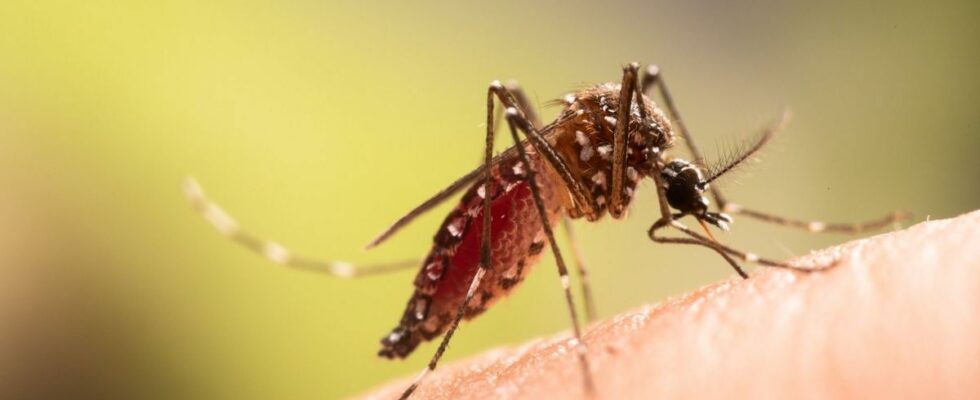Published on
Updated
Reading 3 min.
in collaboration with
Dr Gérald Kierzek (Medical Director)
A case of dengue fever has been detected in a person living in Colle-sur-Loup in the Alpes-Maritimes department. This is the first indigenous case of dengue fever identified this year in the region. Mosquito control and surveillance will be implemented. How to protect yourself from this disease? Advice from our medical director.
A viral disease usually circulating in hot countries, dengue fever is gaining ground in Europe. The number of dengue cases is increasing sharply in France between 2023 and 2024.
Mosquito control and door-to-door survey to prevent the spread
Dengue fever is transmitted through the bite of a mosquito infected with the dengue virus (tiger mosquito in mainland France). As a reminder, we speak of an indigenous case when a person has contracted the disease in mainland France and has not traveled to a contaminated area in the 15 days preceding the onset of symptoms.
To prevent the spread of the disease, the Regional Health Agency (ARS) of the Alpes-Maritimes specified that mosquito control was carried out by the Interdepartmental Agreement for the Mosquito Control of the Mediterranean Coast (EID-Med) to the east of the municipality (public roads, private gardens). The objective is to eliminate potentially infected adult mosquitoes to prevent them from biting other people in the neighborhood and to eliminate larval breeding sites.
“This mosquito control action will be supplemented by a door-to-door survey carried out by the ARS and Public Health France in the area concerned to identify people who may present symptoms, inform them on the conduct to adopt and disseminate prevention messages.” specifies the ARS. Furthermore, it declares that “Hospitals, private doctors and medical analysis laboratories in the sector are also mobilized to care for and screen people who may present symptoms of dengue fever and report them to the ARS“.
What are the symptoms of dengue fever?
“The majority of dengue cases are asymptomatic” recalls Dr. Gérald Kierzek. However, in some cases, patients infected with the virus can develop a high fever, abdominal, joint and muscle pain, vomiting, chills, nausea and sometimes a rash.
“In the event of very strong symptoms – acute pain or signs of bleeding – or contamination in a fragile patient – immunocompromised for example – a rapid consultation with a doctor is necessary” advises Gérald Kierzek. “Otherwise, paracetamol remains the reference treatment to take“, avoiding aspirin and nonsteroidal anti-inflammatory drugs (NSAIDs).
When the person is symptomatic, it is advisable to sleep under a mosquito net, to avoid being bitten by a mosquito which could then spread the virus during its next bite.
No effective vaccine available
Doctissimo’s medical director points out that there are vaccines against the virus but that their effectiveness is limited. Currently, only one, the vaccine from the French group Sanofi, is available in France, but its effectiveness is limited and, moreover, it can cause more severe dengue fever in people who have never caught the virus (according to the mechanism of facilitating infection by antibodies). New vaccines should soon arrive on the market, including Qdenga from the Takeda laboratory.
But today, the best protection is prevention against bites.
According to Public Health France, Aedes mosquitoes “develop mainly in urban areas and move little during their life“.
So be careful with the places that can be created, which will be favorable to the laying of eggs by female mosquitoes, such as vases, saucers, used tires, poorly emptied gutters, various waste containing stagnant water, but also tree hollows, certain plants likely to form water retention. It is therefore requested to store away from the rain anything that can contain water (buckets, watering cans) and to cover water reserves (barrel, can, untreated swimming pool) tightly or with a mosquito net.
To avoid being bitten, it is also recommended to use repellent sprays or creams, coils, electric diffusers, long clothing and mosquito nets and to use air conditioners or fans that annoy mosquitoes. Finally, the use of crib mosquito nets is recommended for newborns.
Finally, it is important to consult your doctor immediately if you experience any suggestive symptoms: high fever, muscle or joint pain, eye pain, fatigue, headaches.
